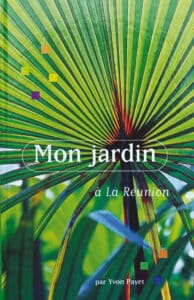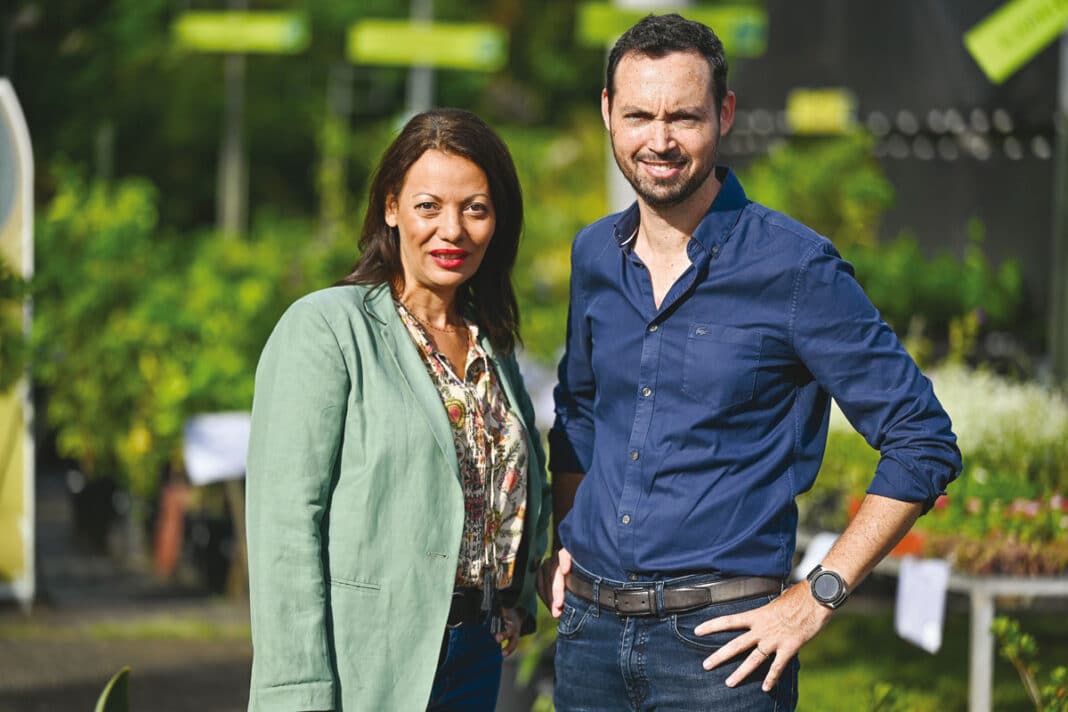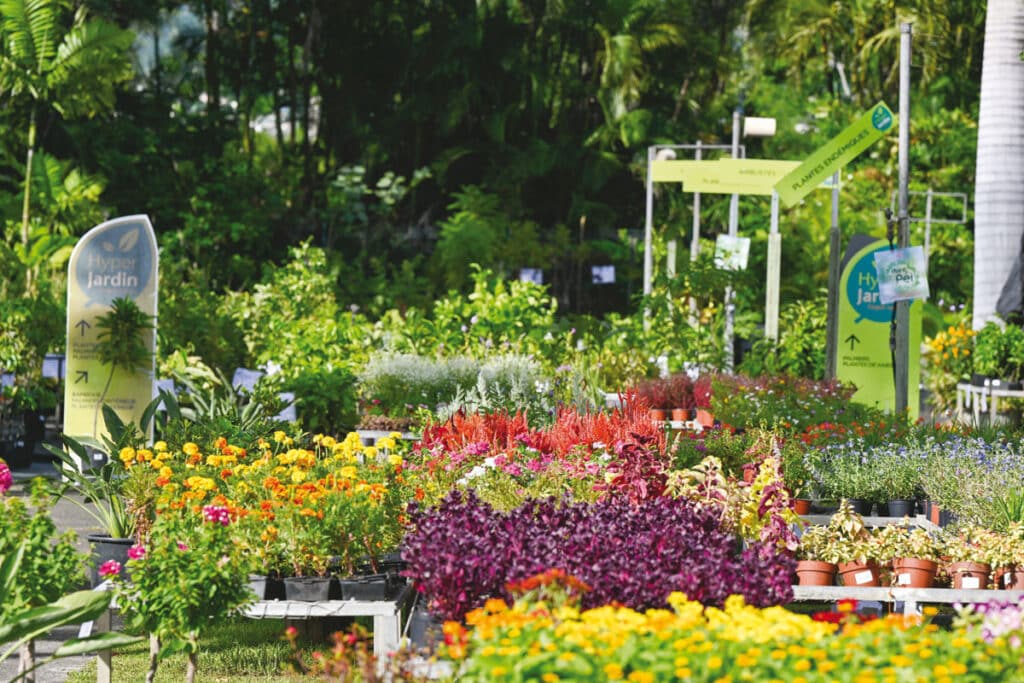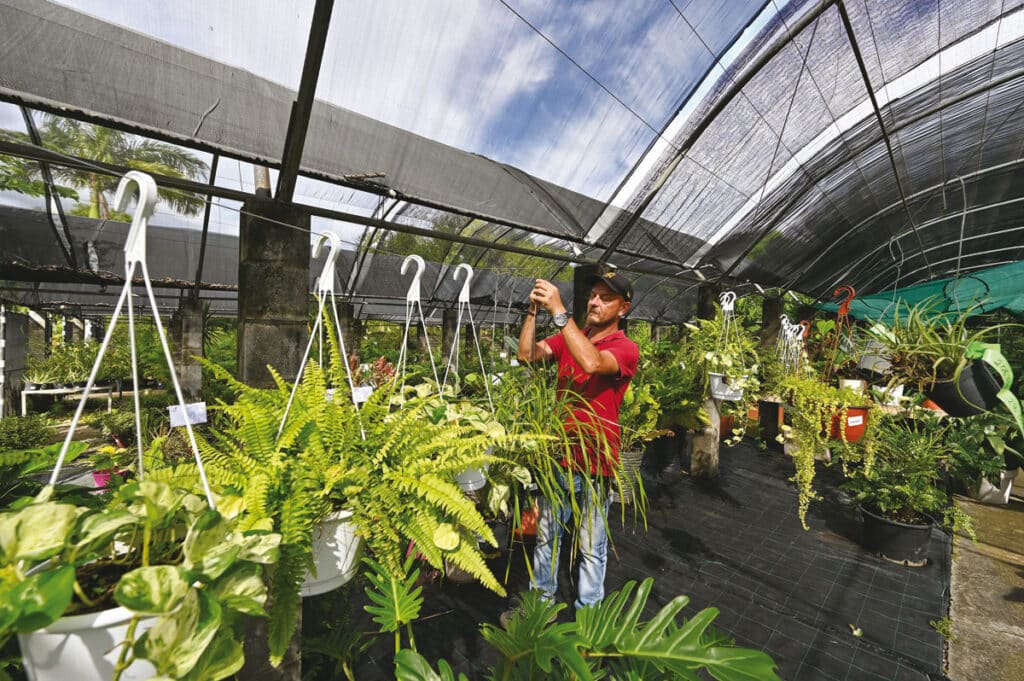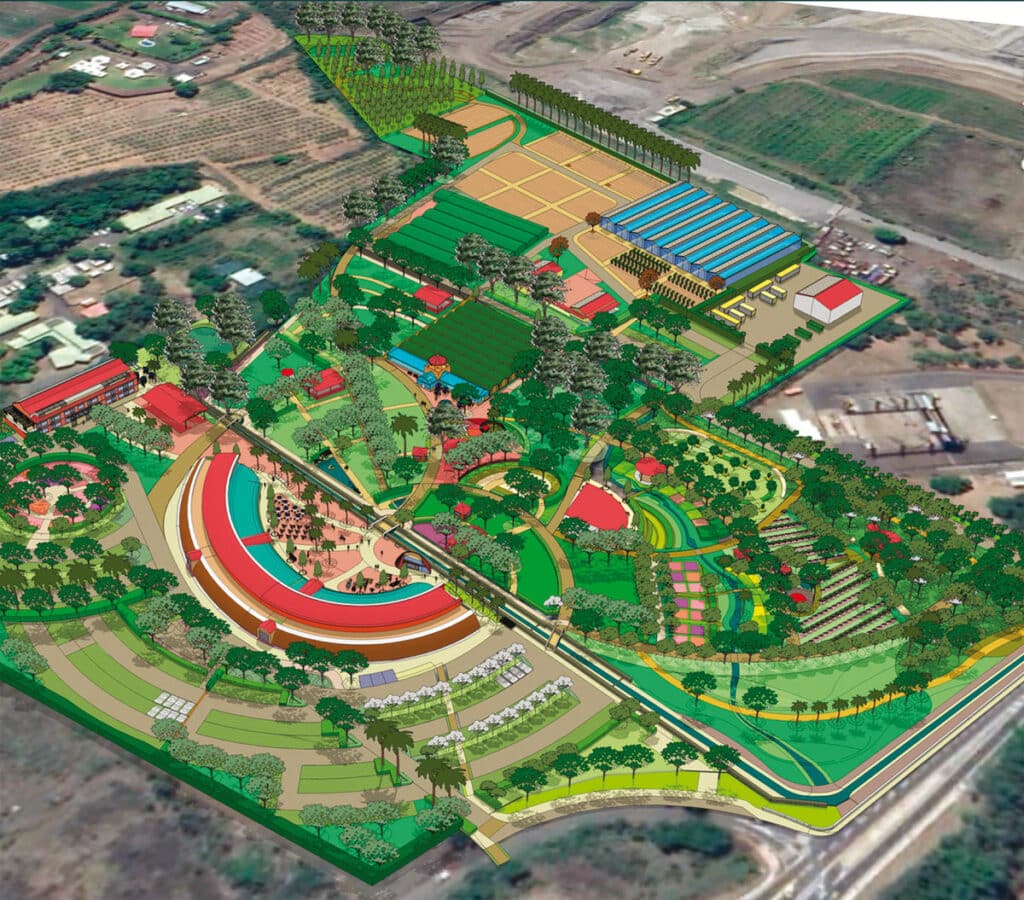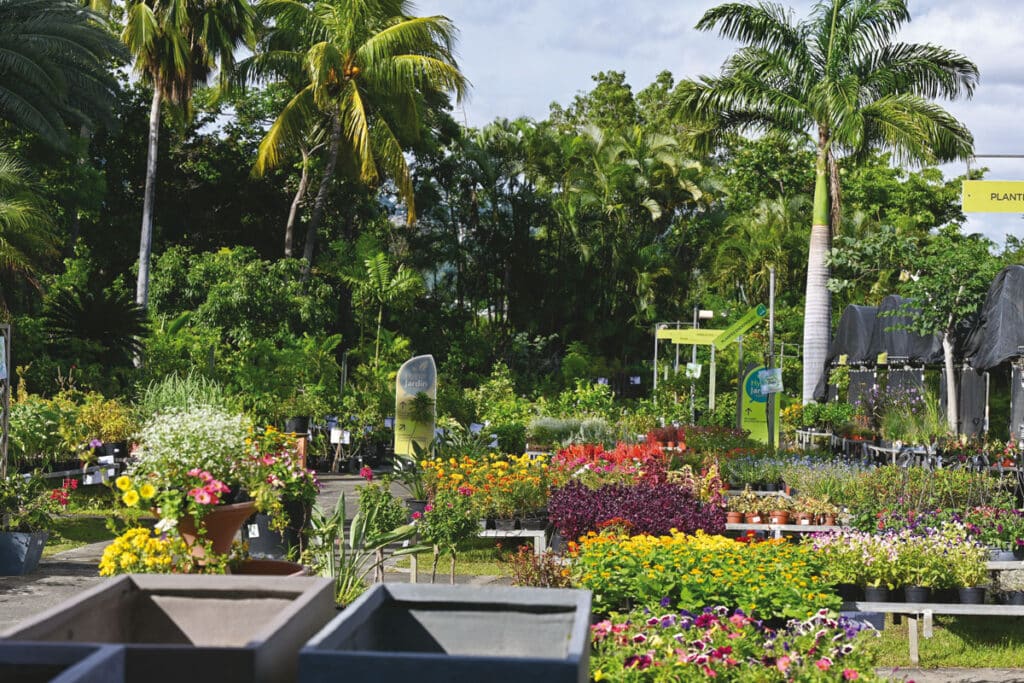Son of Yvon Payet, founder of Hyper Jardin, Yvann Payet grew up in the heart of nurseries and inherited a love of plants from his father. Delphine De Dea Payet is an urban planner and developer. The two co-directors of the Phytam group share their experiences, skills and convictions in the pioneering Meristem agrotourism park project. Born from the announced expropriation of Hyper Jardin to create the eco-city of Cambaie, Meristem would take place on an area of nine hectares in Grand Pourpier. Since its presentation in March 2022, its innovative and unifying character arouses admiration and enthusiasm, but also questions through the new, renewed vision that it gives of agricultural and natural spaces and territorial planning.
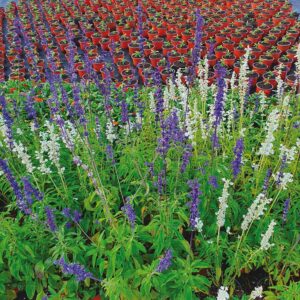
Delphine De Dea Payet and Yvann Payet : The Reunionese is attached to “his island”,to “his land”. And whether it is the soil from a planter in a city apartment or that from the garden of a hut, whether as an expert in botany, as a self-taught enthusiast or thanks to oral transmission from our elders, we are all children who put our hands back in the earth when we grow plants ! This taste, this pleasure in gardening that we share is timeless. The urban scale does not matter. We all have a civic role towards the environment and nature. Positioned across the entire value chain of the tropical plant economy, our Phytam group gives everyone the means to continue to cultivate our Reunion land with simplicity, authenticity and respect.
“The spirit of nature” : the Hyper Jardin slogan applies to all activities of the Phytam group. How to define the spirit of nature at the start of the 21st century ?
Phytam is a company with a mission whose purpose is to develop tropical plants through green and virtuous values., human and innovative. This is today our updated definition of “the spirit of nature”, slogan thought up by Hyper Jardin thirty-two years ago. When we committed three years ago to a total CSR overhaul of all the group's companies, this new nature spirit was our guiding principle. The plant sector is a so-called “positive” economic activity since we plant trees. Nevertheless, we bear the responsibility to ensure that we minimize our impact on the environment, whether in our imports (bilan carbone), in the use of our containers (plastic limitation), in the management of water or our waste, etc. The spirit of nature, at the beginning of the 21st century, is therefore responsible, but also authentic and poetic. Authentic with a return to basics and the joy of simple pleasures like seeing a plant grow. Authenticity, it is also for us the transmission of practical knowledge and horticultural know-how to the youngest, enthusiasts or those furthest from the world of gardening to help their social integration. Poetic finally, because it carries meaning : the spirit of nature, it’s dreaming of a better world, to a lasting harmony with the plants that surround us.
Few local businesses have chosen to become “mission-based” by establishing a reason for being. Why did you take this step? ?
Because it’s in our DNA. We did not see the creation of a mission-driven company as a great communication action that we will brandish as a “greenwasher”. These were personal values that we also carried on a daily basis.. We wanted to create Phytam as a company with a mission, because we were keen to take into account the general and societal interest for the Reunion Island territory, in each of our actions. To ensure that our approach remains at the very center of our economic activities, we chose to position it in the group’s DNA, that is to say in its statutes. We can thus interact in cascade with our other companies, whether on the horticultural production of our nurseries, on our sales area, in our service delivery structure. The statutory objectives of the mission-driven company have been broken down for each of the group's companies according to their specificities., with concrete and operational implementation actions.
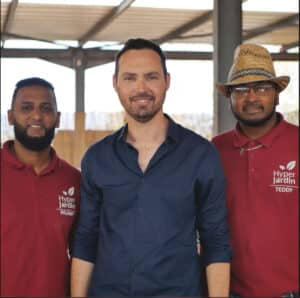
First, this is its configuration. Hyper Jardin is an independent and family garden center built on the model of a floral park. Beyond the store, it has been designed so that families can stroll through the heart of flowery and green paths and enjoy a refreshing place. For over thirty years, we kept this vision of an atypical sales space, where plants are omnipresent. Ensuite, Hyper Jardin is part of a family group on a human scale which controls the entire value chain of Reunion tropical plants. : agricultural land is managed by the GFA des Karamboles, production by Horticole Payet Yvon and Tropicarun, marketing by Hyper Jardin, and support and engineering services with Areka Réunion. All skills are complementary and enrich the advice given to our customers. There is also business expertise : our plants are produced by our teams of horticulturists in nurseries located a few hundred meters from the garden center. So, the client is assured of having advice adapted to the climate, on the soil and geography of the island. Finally, there is the transmission of knowledge which characterizes Hyper Jardin. Some of our nursery horticulturists or sales advisors have been working at the garden center for more than twenty years. They train our new arrivals to guarantee the sustainability of farming techniques. For sellers, it is also a pride to share their knowledge with visitors.
Hyper Jardin is now part of Reunion’s heritage. The name of Phytam, on the other hand, is less known. Can you summarize the story that leads from one to the other? ?
Yvon Payet was visionary in creating businesses that did not yet exist on the island : garden center, import of new brands of gardening equipment. Each company being autonomous in its operation. The challenge of taking over and rebuilding businesses in 2019 was to give overall consistency to these structures to adapt to market developments.. Bringing together and articulating these structures with a common vision has made us more resilient.. In parallel, Phytam is now seeking to diversify its activities linked to tropical plants. : to feed, decorate, embellish, cure, share, opening up to the world... These are all variations carrying societal innovations that Phytam embodies today thanks to our complementary leadership.
How the different companies in the group work together ?
Phytam is a business consulting SAS, specialized in the restructuring of companies via CSR and in the support of agroterritorial projects. It is also the brain of our organization. Areka Réunion is the executive, the “spinal cord” which orchestrates the strategy and develops the action plan : it is a support and engineering services company, mainly for the group. Horticole Payet Yvon and Hyper Jardin are the “arms and legs” by allowing the realization through production and sale. This set will be completed soon by the company Dypsis, which will be a local green space development company, for individuals and businesses.
The Meristem agrotourism park is the quintessence of your respective professional experiences and your beliefs. More, to carry out such a project, you need a solid group. How is the Phytam group positioned in the Reunion horticulture landscape? ? Is it present in all families of horticultural production ?
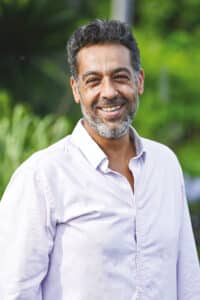
How are the horticultural markets doing? ? Are they affected by the inflationary context ?
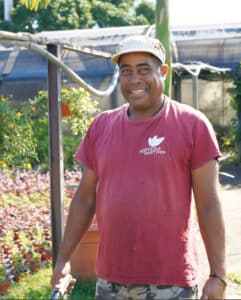
You put forward a concept of “green engineering”, associated with societal strategy consulting, as well as a concept of “green land”, associated with the economy of functionality. What do these terms cover? ?
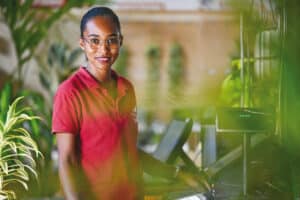
This approach links agricultural professions to multiple skills other than farming..
Indeed, to implement such projects or programs, innovative and proven skills are essential : setting up complex projects, expertise in the field of planning, but also that of horticulture and plants, in urban agriculture, in the management of multiple and coordinated companies (which will be the profit centers), in societal and territorial innovations... The setting to music of a program like Meristem is not a simple agroecological project. It is the creation of an agricultural third place with hybrid functionalities, of general interest, carried by a private actor. Its articulation is also, for now, unclassifiable for the administrative organization in place ! The “green” engineering that we must imagine and implement requires technicality and creativity, because a project like Meristem does not exist anywhere.
Isn’t it a new relationship with plants that is emerging behind these concepts? ?
Of course ! It’s a new way of looking at our relationship with what surrounds us., and our relationship to business, at work, to solidarity. Why break up the value chain of a product rather than offering it in its entirety and in the same place ? Why think that development is not compatible with agriculture or with the preservation of biodiversity in natural spaces?, like urban microforests ? Why couldn't a private individual address the issue of the general interest while creating a profitable business? ? Our values, and the vision we have for the development of the Reunion territory, overcome these divisions to move towards a real and sincere commitment to our action. We simply hope that this momentum will be followed by stakeholders motivated by this renewal.
Last year, you presented the broad outlines of the Meristem project which gives substance to this innovative approach.. Meristem innovates by integrating several functions, like a plant. Can you remember what these functions are?, and therefore the different activities that can interact on site ?
Meristem will bring together several activities into a third place deploying : services, shops, restaurants, places to relax for families ; rental of spaces in the heart of the park for professionals and tourists ; a nursery exclusively reserved for professionals ; educational and practical support for schools and plant and well-being enthusiasts.
Is the Phytam group the only one to finance this project? ?
Today, the land belongs to us. Phytam therefore finances project engineering with its own funds. No community has to date shown sufficient interest to be part of the project, despite the 150 jobs that we will generate in a few years, a tropical plant school to train Reunion Islanders and a tourist area dedicated to Reunion horticultural excellence. State representatives at the local level stumble, as far as they are concerned, on the regulatory aspect of the project without supporting us in a search for solutions. And local elected officials seem absent despite the obvious parallel with the neighboring ecocity.
What happens to the Hyper Jardin garden center : is it integrated into the Meristem project ?
This year, the Hyper Jardin de Saint-Paul Cambaie celebrates its thirty-two years of existence. Expropriated by the ecocity project, we wanted a repositioning of the garden center on its perimeter, but this was not possible for the TCO. So obviously, we would like her to be part of Meristem, but in a new floral park format.
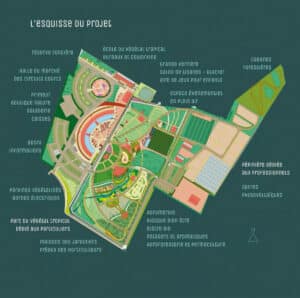
We are currently working on the pre-operational studies of the park and its legal-financial set-up.. Nevertheless, we are already considering energy autonomy thanks to photovoltaic panels installed in a horticultural production greenhouse ; our plants need shade. Waste management is coordinated within the park knowing that, for us, certain materials are a resource, like green waste which is very useful to us for mulching. The water is 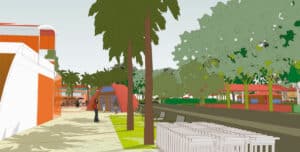
What will Meristem’s catering offer be? ?
Meristem will offer three distinct healthy catering areas based on market garden produce from the park and a future market hall for short circuits with local organic or sustainable agriculture producers from Reunion Island., with whom we will share the same values. There will therefore be a salad and cooked meal restaurant for lunch, a herbal tea room (aromatic, medicinal plants, ice creams and sorbets, jus) and an organic bistro, which we hope open in the evening or for festive events. We are currently thinking about how to implement this type of function in the park., without it being a nuisance for local residents, but rather a place of conviviality and tourist development.
You presented Meristem at the international exhibition of territorial innovations, Innopolis expo 2022. How was the project received, and do such spaces exist in mainland France? ?
Innopolis expo welcomed us wonderfully in September 2022 ! We were able to present the project on a specific stand,, as well as in a pair conference with the Ministry of Sustainable Development.
Professional visitors asked us a lot about the assembly and production of Meristem, they praised the particularity of our team in imagining this type of project. Our Reunion skills and specificities were really highlighted, and we have already been invited to reproduce this program in other overseas territories, as well as in two Maghreb countries.
What are the reactions of the institutions, communities, public developers for your project ?
Since the launch of the project with institutions in August 2022, we were received by several ministerial offices, as well as that of the Prime Minister. Locally, to date, only five public figures responded to us. Concerning the technical sphere and developers, we hope to meet with the ecocity team. Fortunately, we work together with the TCO services who mobilize alongside us.
You plan to open Meristem in mid-2025. Where are you in the project programming? ?
Between 2019 and 2020, we worked on its feasibility. Since 2021, we are working on the reorganization of our internal activities and the fundamental overhaul of our companies to enable support from Meristem. At the start of 2023, we continue our consultations with the instructing services and carry out studies relating to administrative authorization requests. Finally, At the same time, we are organizing the first phase of the project. It concerns the reappropriation of agricultural and horticultural production in situ which does not require specific regulatory validations.. It will allow the planting of numerous endemic trees and a citrus grove., of the food plant zone, vegetable and aromatic, and boundary hedges and dedicated agricultural paths. On the other hand, this phase will be that of a development of our horticultural production, both for professionals and for a sector dedicated to production-sale to individuals. Its opening is scheduled for the first half of 2024.
* Union of horticulturists and nurserymen of Reunion Island.
** Departmental Commission for the Preservation of Natural Areas, agricultural and forestry.
*** Called tipping waters, Irrigation of the West Coast (ILO) provides a large-scale solution to the chronic water deficit on the western slopes of Reunion Island. The water captured in the cirques of Salazie and Mafate is transported by gravity through the mountain by a tunnel and distributed on the west coast from La Possession to Saint-Leu.
Meristem : some key figures
• 46,740 m2 of green spaces.
• 4,800 m² of ecological water management spaces.
• 1,000 trees and shrubs planted.
• 300 varieties of plants to discover.
• 3,000 m2 of photovoltaic greenhouses.
• 188 green parking spaces.
• 16 professions represented.
• 150 permanent jobs.
THE UNION OF HORTICULTURE AND URBAN PLANNING
